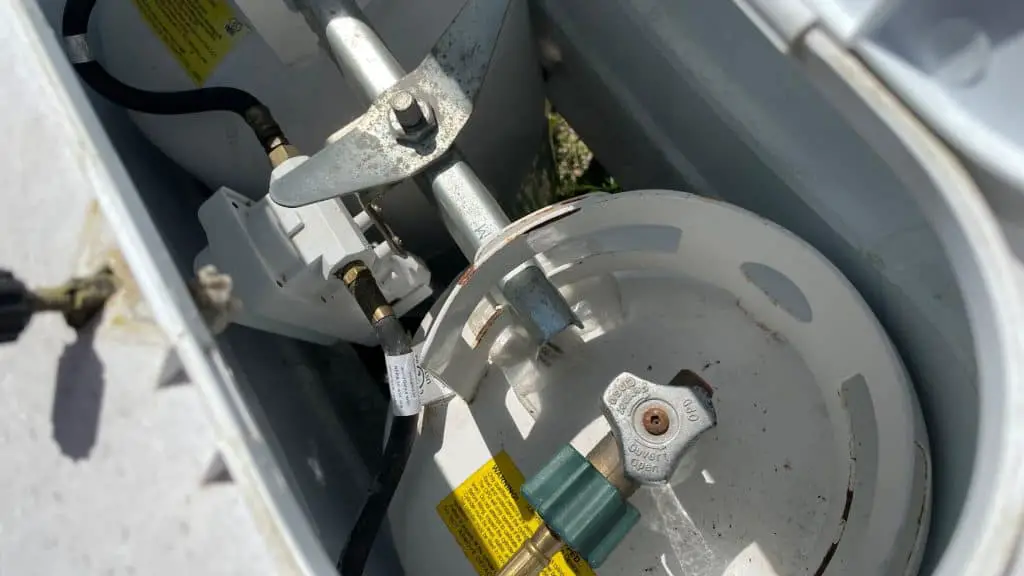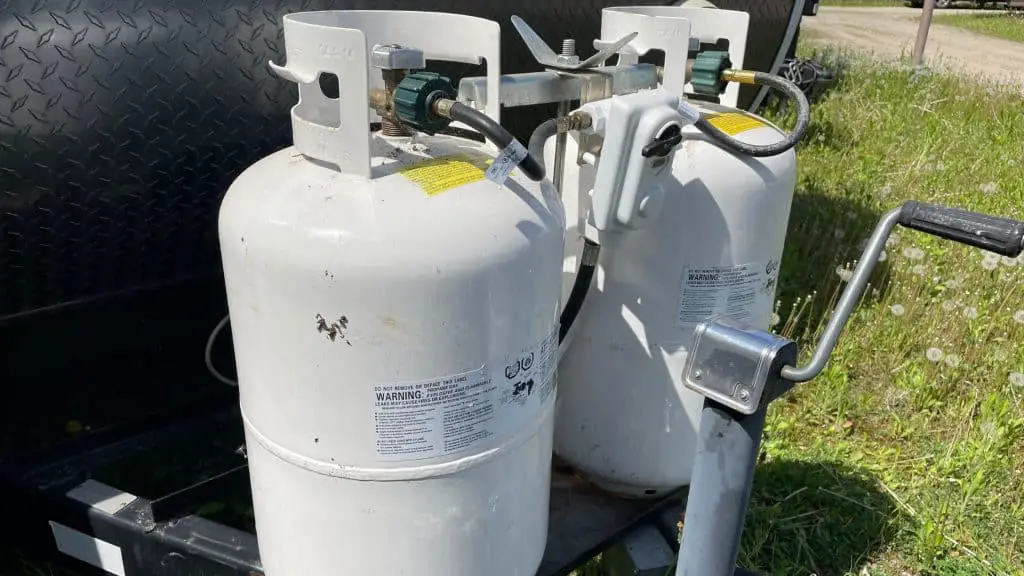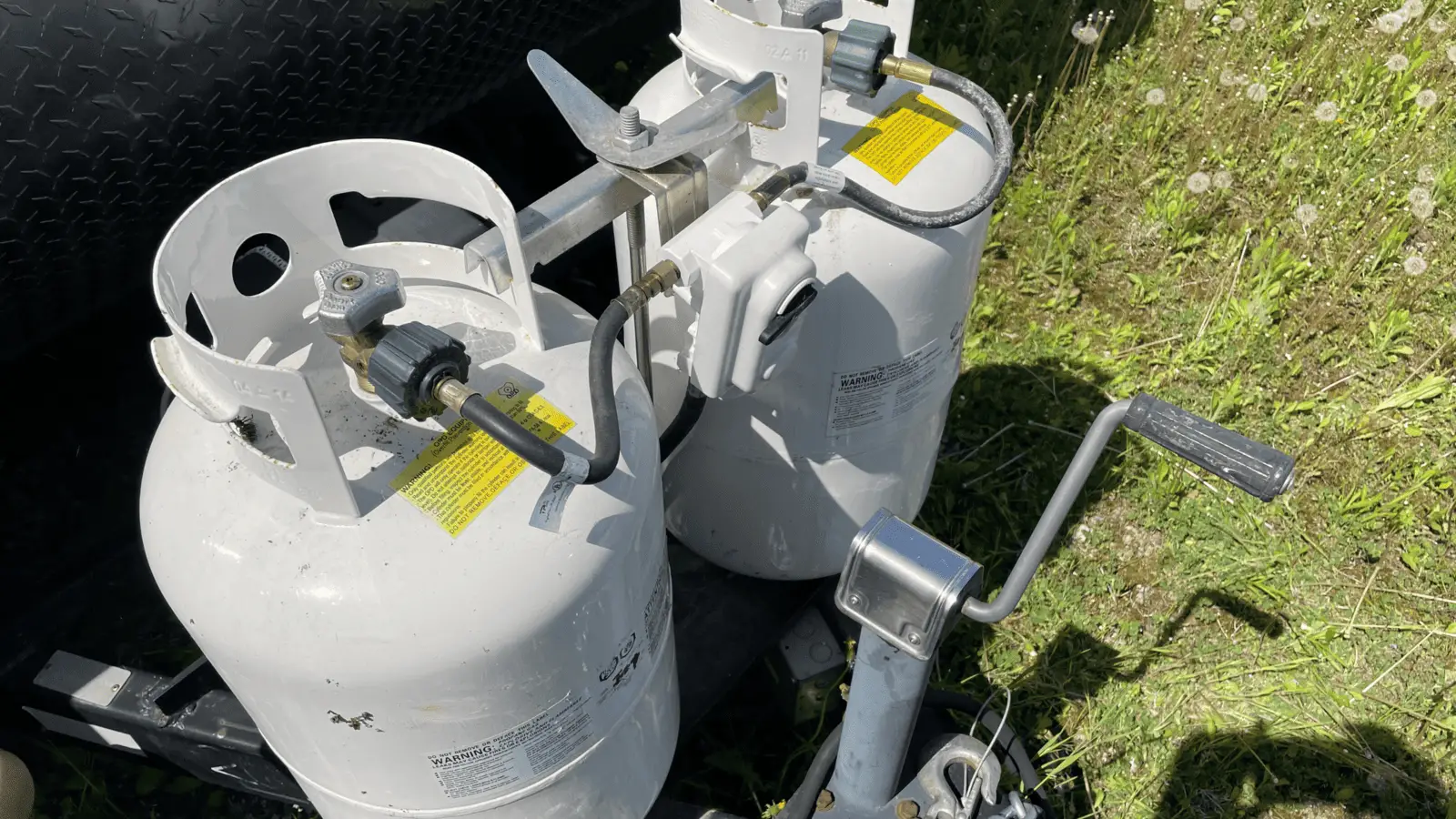A well-maintained propane system is essential for the safe and efficient operation of your travel trailer. This article will provide helpful tips and information on maintaining and repairing your travel trailer’s propane system.
Understanding the Components of Your Travel Trailer’s Propane System
Your travel trailer’s propane system consists of several key components:
- Propane tanks: Store and supply propane gas.
- Regulators: Control the pressure of the propane gas.
- Hoses and connectors: Transport propane gas from the tanks to appliances.
- Appliances: Stove, oven, water heater, furnace, and refrigerator that use propane as a fuel source.
- Propane detectors and alarms: Alert you to potential gas leaks.
Understanding these components and how they work together will help you maintain and repair your propane system effectively.
Safety Precautions When Working with Your Travel Trailer’s Propane System
Working with propane systems can be dangerous if not handled correctly. Always follow these safety precautions:
- Turn off propane tanks and appliances before performing any maintenance or repairs.
- Do not smoke or have open flames near propane tanks or lines.
- Work in a well-ventilated area.
- Wear proper protective gear, such as gloves and safety glasses.
- If you suspect a gas leak, evacuate the area and call a professional immediately.
Regular Inspection and Maintenance of Propane Tanks and Hoses
Inspect your propane tanks and hoses regularly for signs of wear, damage, or corrosion. Look for cracks, dents, and rust on the tanks, as well as worn or damaged hoses and connectors. Replace any damaged components as necessary.
How to Detect and Fix Propane Leaks in Your Travel Trailer
To detect propane leaks:
- Perform a visual inspection for damaged hoses or connections.
- Use a gas leak detector or a soapy water solution to check for leaks around connections. Bubbles will form if there is a leak.
- If a leak is detected, turn off the propane tank and repair or replace the damaged component.
Never attempt to repair a propane tank yourself. If a tank is leaking, replace it or have it serviced by a professional.
Proper Storage and Transportation of Propane Tanks for Travel Trailers
Follow these guidelines for storing and transporting propane tanks:
- Store tanks in an upright position, away from direct sunlight and heat sources.
- Ensure tanks are securely fastened to your travel trailer during transportation.
- Close the valve on the propane tank when not in use.
- Do not store propane tanks indoors or in enclosed spaces, such as your travel trailer’s living area.
The Importance of Pressure Regulators in Maintaining Your Travel Trailer’s Propane System
Pressure regulators control the flow of propane gas from the tank to your appliances, ensuring they operate safely and efficiently. Check your regulator for signs of wear or damage and replace it if necessary. Test the regulator’s functionality by observing the flame on your propane appliances – if the flame is too low or too high, the regulator may need adjustment or replacement.
Take a look at our article on: Great 10 RV Propane Regulator Options On The Market
Troubleshooting and Fixing Issues with Propane Appliances in Your Travel Trailer
Common issues with propane appliances include:
- Pilot light not staying lit: Check for debris in the pilot light assembly and clean if necessary.
- Uneven flame or low heat output: Clean the burner and ensure the regulator is functioning properly.
- Appliance not igniting: Ensure the propane tank valve is open and there is propane in the tank.
If you are unable to resolve the issue, consult your appliance’s owner’s manual or contact a professional.
How to Clean and Maintain Your Travel Trailer’s Propane Stove and Oven
To clean and maintain your propane stove and oven:
- Turn off the propane supply and ensure the appliance is cool before cleaning.
- Remove any removable parts, such as grates and burner caps, and clean them with warm soapy water.
- Use a soft brush or cloth to clean the burners and igniters, removing any debris or buildup.
- Wipe down the stove and oven surfaces with a damp cloth and mild detergent.
- Reassemble the appliance and test for proper function.
Regular cleaning and maintenance will ensure your propane stove and oven operate efficiently and safely.
The Role of Propane Detectors and Alarms in Travel Trailer Safety
Propane detectors and alarms are essential for detecting gas leaks and preventing potential accidents. Test your propane detector regularly and replace the batteries as needed. If the detector is malfunctioning or reaches the end of its lifespan, replace it immediately.
Replacing Worn or Damaged Propane Hoses and Connectors in Your Travel Trailer
Inspect propane hoses and connectors regularly for wear, damage, or leaks. Replace any damaged components with the appropriate parts for your travel trailer’s propane system. When making repairs or replacements, ensure all connections are secure and leak-free.

How to Safely Refill Your Travel Trailer’s Propane Tanks
Follow these steps to safely refill your propane tanks:
- Close the valve on the propane tank and disconnect it from your travel trailer.
- Transport the tank to a certified propane filling station.
- Have the tank refilled by a trained professional.
- Reconnect the tank to your travel trailer, ensuring all connections are secure and leak-free.
- Open the valve on the propane tank and check for leaks.
You may be interested in this article we have: Why Is My Propane Alarm Going Off In My Camper?
Maintaining and Servicing Your Travel Trailer’s Propane Water Heater
Regular maintenance of your propane water heater includes:
- Flushing the system to remove sediment and mineral buildup.
- Inspecting and cleaning the burner assembly.
- Checking the pressure relief valve for proper function.
- Inspecting the anode rod and replacing it if necessary.
Refer to your water heater’s owner’s manual for detailed maintenance instructions and schedules.
The Impact of Altitude and Temperature on Your Travel Trailer’s Propane System
Changes in altitude and temperature can affect the performance of your propane system. Higher altitudes may require adjustments to the air-fuel mixture for optimal performance, while extreme temperatures can cause pressure fluctuations in the propane tank. Consult your travel trailer’s owner’s manual or contact a professional for guidance on adjusting your propane system for these conditions.
Take a look at our article on: Best 6 Replacement RV Propane Tank Covers Options
Winterizing Your Travel Trailer’s Propane System: Tips and Precautions
To winterize your propane system, follow these steps:
- Turn off and disconnect all propane appliances.
- Close the valve on the propane tank.
- Drain any residual propane from the hoses and regulator.
- Store the propane tank in a safe and dry location, away from extreme temperatures.
- Inspect and repair any damaged components before storing your travel trailer for the winter.
How to Maintain and Repair Your Travel Trailer’s Propane Furnace
To maintain your propane furnace:
- Clean the burner assembly and heat exchanger regularly.
- Inspect the blower motor and fan for proper function.
- Check the furnace’s air intake and exhaust vents for blockages or damage.
If your furnace is not functioning properly, consult the owner’s manual or contact a professional for assistance.
Troubleshooting Common Issues with Travel Trailer Propane Refrigerators
Common issues with propane refrigerators include:
- Insufficient cooling: Ensure the refrigerator is level and the propane supply is adequate.
- Ignition failure: Clean the burner and check the propane supply.
- Poor performance at high altitudes: Adjust the air-fuel mixture as needed.
Consult your refrigerator’s owner’s manual for additional troubleshooting tips and guidance.
Understanding the Importance of Propane Tank Certification and Re-certification for Travel Trailers
Propane tanks are required to undergo periodic inspections and certifications to ensure they meet safety standards. Check your propane tank for the manufacture date and certification information. Tanks typically need re-certification 10 to 12 years after the manufacture date, and every 5 years thereafter. Have your tank inspected and re-certified by a certified propane professional as needed.
How to Properly Dispose of Expired or Damaged Propane Tanks from Your Travel Trailer
To dispose of expired or damaged propane tanks:
- Make sure the tank valve is closed and the tank is empty.
- Contact your local waste management facility, recycling center, or propane supplier for instructions on proper disposal.
- Follow their guidelines to safely dispose of the tank.
Never attempt to dispose of propane tanks in your regular trash, as this poses a safety hazard.
Converting Your Travel Trailer’s Propane System to a Dual Fuel System
Dual fuel systems allow your travel trailer to run on propane as well as another fuel source, such as natural gas. Converting to a dual fuel system can provide increased flexibility and fuel efficiency. Consult a professional for guidance on the appropriate conversion kit and installation process for your travel trailer’s propane system.

DIY Tips and Essential Tools for Maintaining and Repairing Your Travel Trailer’s Propane System
To maintain and repair your travel trailer’s propane system, it’s helpful to have some essential tools and knowledge:
- Basic hand tools, such as wrenches, pliers, and screwdrivers.
- A propane leak detector or soapy water solution for detecting leaks.
- A soft brush or cloth for cleaning appliance burners and pilot light assemblies.
- A basic understanding of the components and operation of your propane system.
Regular maintenance and timely repairs will help keep your travel trailer’s propane system functioning safely and efficiently. Remember to always follow safety precautions and consult a professional if you are unsure about any aspect of maintaining or repairing your propane system.
Good luck, and happy camping!
Check out our article on: Camper Fridge Propane Usage: How Long Will Your Tank Last?

